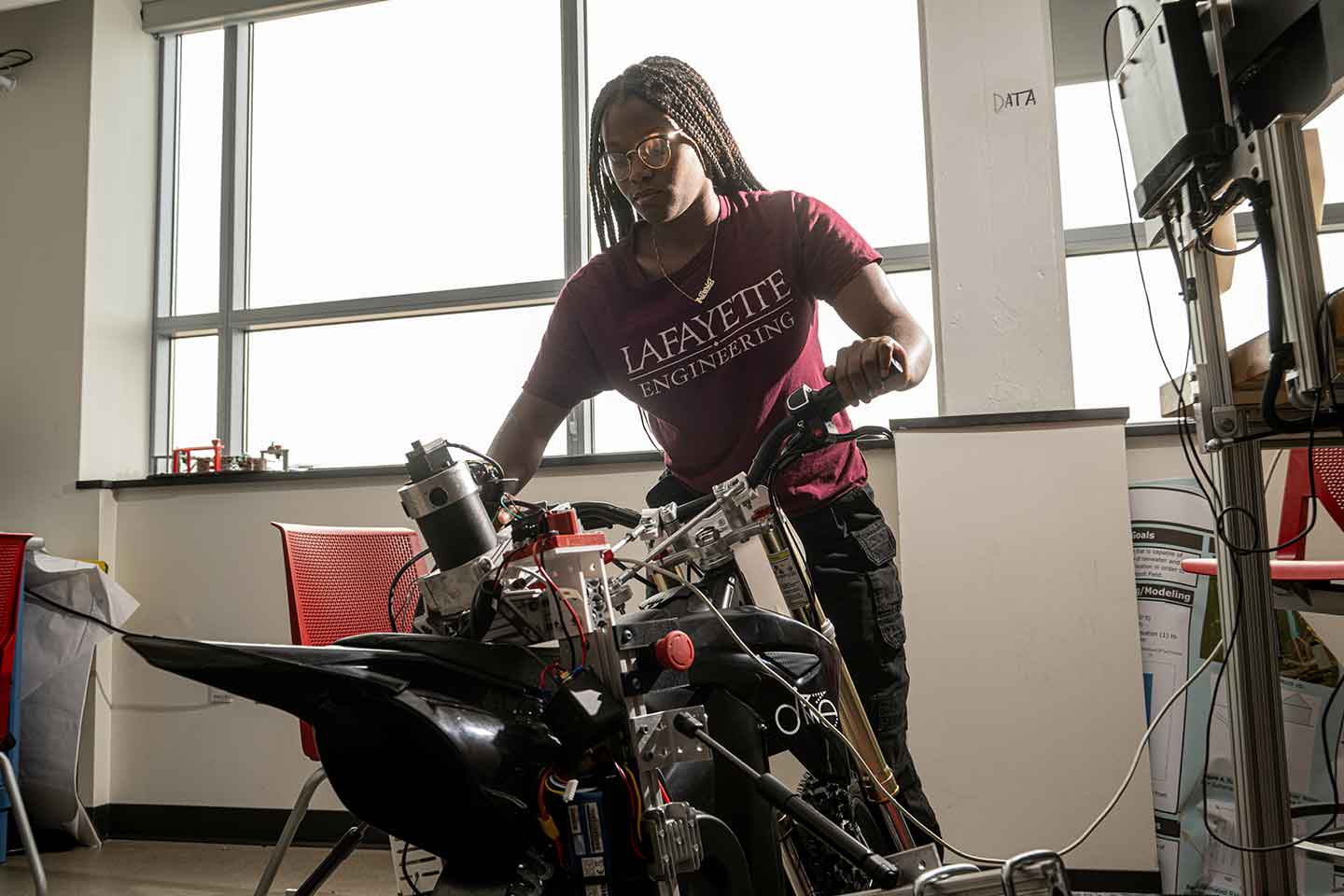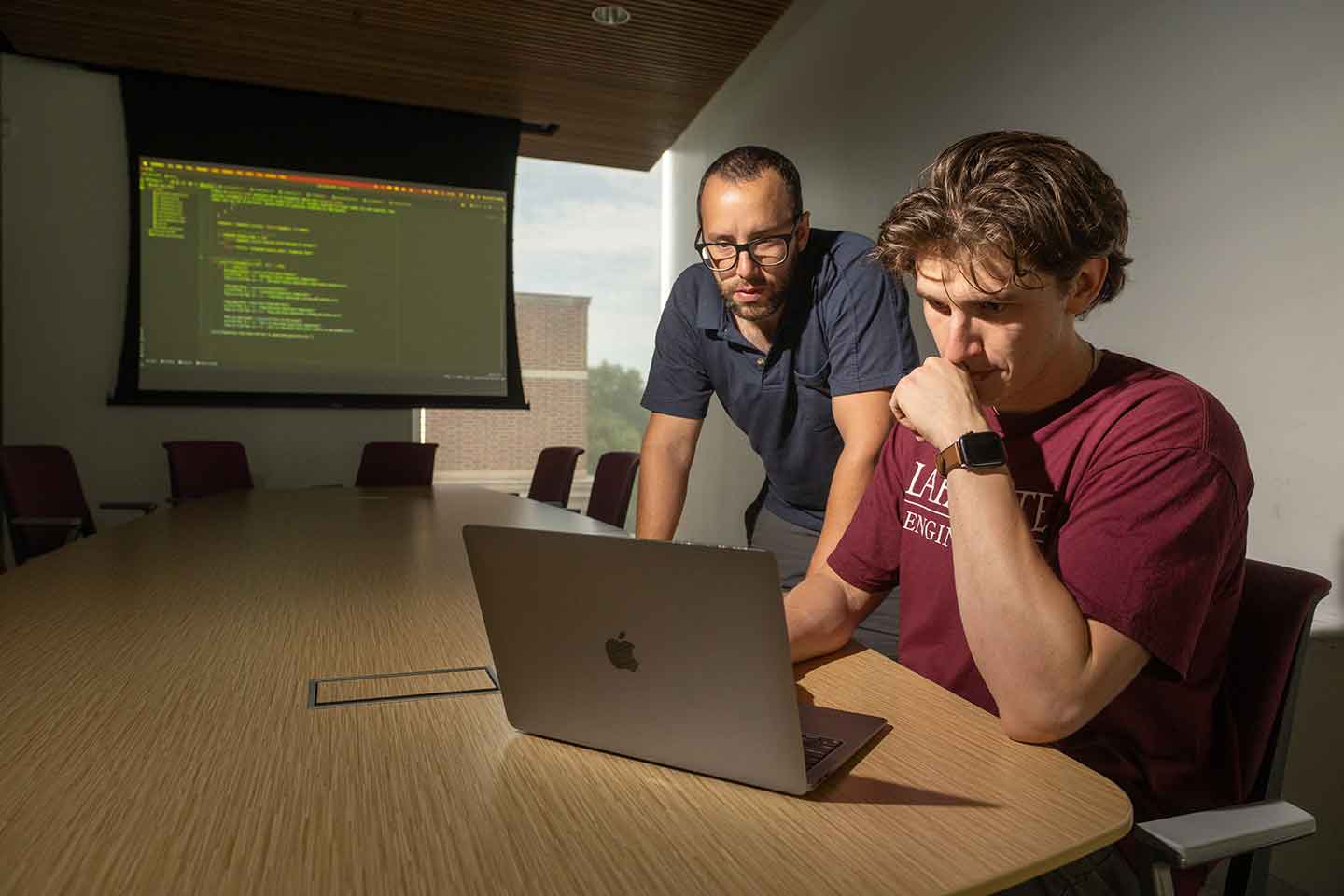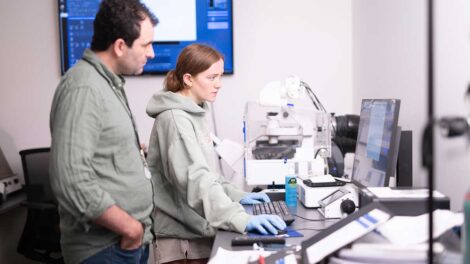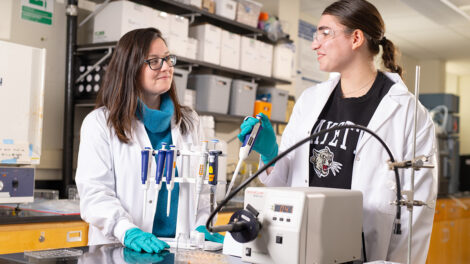Advancing allyship in STEM

As a CBL scholar Paris Francis ’26 continued research this summer with associate professor of mechanical engineering Alexander Brown to improve motorcycle safety. | Photo by Adam Atkinson
By Jill Spotz
Junior Paris Francis ’26 spends a great deal of time thinking about motorcycle dynamics. Now in her second year as a Clare Boothe Luce (CBL) Scholar, Francis continued research this summer with associate professor of mechanical engineering Alexander Brown, which will ultimately improve motorcycle safety. As an integrative engineering major with a concentration in robotics and a minor in electrical and computer engineering, Francis is fulfilling her dream of participating in research as an undergraduate.
“I knew I wanted my college experience to include opportunities to conduct research,” Francis says. “I enjoy computer science and electrical engineering, but I also like mechanical engineering and controls. The robotics program really encompasses all of my interests. Pairing this program with research that will ultimately improve motorcycle safety has been really exciting.”
Francis is one of 17 CBL Scholars this year who are flexing their research skills through the Clare Boothe Luce program, a transformative initiative that has been reshaping the landscape of undergraduate research at Lafayette. What began with the first CBL grant in 2016 has now blossomed into a powerhouse of support for female students, sparking a new era of inclusivity at the College.
The journey of the CBL program at Lafayette is one marked by milestones of progress and impact. Lauren Anderson ’04, professor and William Jeffers Dean of Engineering, reflects on the program’s evolution. “We have seen remarkable growth in research opportunities for women at Lafayette,” Anderson notes. “Prior to CBL, only 20% of women engineering students participated in research. This past year, we achieved a historic high of 58%.”
A notable enhancement to the CBL program has been the introduction of the Ally component in 2021, which supports male students with the same benefits as female CBL Scholars. Allies are funded through the College’s existing EXCEL faculty-student research program, yet also receive mentorship and attend programs specifically geared toward creating inclusive communities throughout the summer.
“The Ally program equips male-identifying students with tools to foster inclusive workplaces,” Anderson explains. “It’s not just about research; it’s about preparing future leaders who understand and champion diversity.”
During the academic year, CBL Scholars and Allies participate in events, meet with Lafayette alumni currently in graduate school to learn about postgraduate education and career opportunities, attend regional and national professional conferences, and participate in on-campus programming focused on creating an inclusive community.
All of this wouldn’t be possible without funding from the Clare Boothe Luce Foundation and programming offered through the Hanson Center for Inclusive STEM Education. The Hanson Center was funded through a lead gift in 2017 from Heidi Hanson ’91 and her husband, Daniel, and officially launched at the College in 2020. As one of only two inclusive STEM education centers in the country–and the only one at a liberal arts college–the Hanson Center works to advance the understanding and practices of diversity, equity, and inclusion. CBL Scholars and Allies were able to participate in a wide variety of programming offered throughout the summer including sessions on mentorship, writing a technical abstract, perfecting elevator pitches about summer research, and the importance of “upstanders” (instead of bystanders) in creating inclusive communities.
“The CBL Scholar and Ally program embodies our core community values, emphasizing that inclusion is a collective effort, one in which we all play a crucial role,” explains Wendy Hill, Rappolt Professor Emeritus of Neuroscience and director of the Hanson Center. “In addition, working effectively in diverse, multifunctional teams is a catalyst for innovation, and so our students are developing essential skills that will serve them well when they enter the workforce.”
Junior and CBL Ally Miles Morrison ’26 worked alongside Christian Lopez, assistant professor of computer science this summer. Morrison, who is also majoring in integrative engineering with a concentration in robotics, is researching large language models like ChatGPT as a tool to improve engagement in computer science.
“When students are first delving into computer science, the learning curve can be quite steep,” Morrison explains. “This can be very discouraging and makes engaging with the subject difficult. Our research is focused on leveraging large language models to automate the process of tailoring learning material to each student’s unique proficiency level. Our work aims to reduce that learning curve, thereby improving student engagement and enhancing learning outcomes overall.”
Morrison’s research experience this summer helped to solidify his broad interest in robotics and its many potential applications. As Morrison explains, “My current research is just one example of the many advancements in computer science. I like to think about robotics as a vector for the virtual world to interact with the physical world. Advancements in computer science and artificial intelligence are often restricted to the virtual domain. Ultimately, robotics will enable us to extend these advancements past our laptop screens, into the world we live in.”

Miles Morrison ’26 and Christian Lopez, assistant professor of computer science are researching large language models like ChatGPT as a tool to improve engagement in computer science. | Photo by Adam Atkinson
Morrison sees great value in being able to participate in research as an undergraduate where “exposure to the research process is just as valuable as research projects themselves.”
Equally important to this experience is the mentorship and support provided to student-researchers. “CBL Scholars and Allies engage in sessions that are each a stepping stone toward broader cultural change,” Anderson explains. “Our graduates are change makers, equipped not just with technical skills, but with the resilience and vision to shape a more equitable future.”
For Francis, who worked this summer designing the code that allowed a full-size dirt bike to stabilize itself, the CBL program allowed her to increase her research and leadership skills. “My role in the lab has evolved,” Francis explains. “Last summer I was still increasing my knowledge about this research project and the robotics field. “This year, I have been able to lead in the lab. This experience as a CBL Scholar has increased my confidence in my skills and my abilities. It has helped me see how everything that I learned in the classroom is actually applied to engineering concepts.”
For students like Francis and Morrison, who will ultimately graduate and become employed in fields that are predominantly male dominated and lack minority representation, the CBL program, and specifically the Ally component, is aiming to change the culture.
“We are building a culture of inclusion and allyship so that when our students go into industry, they are more intentional about the conversations they’re having with each other,” Anderson says. “We want to change the culture going forward.”

